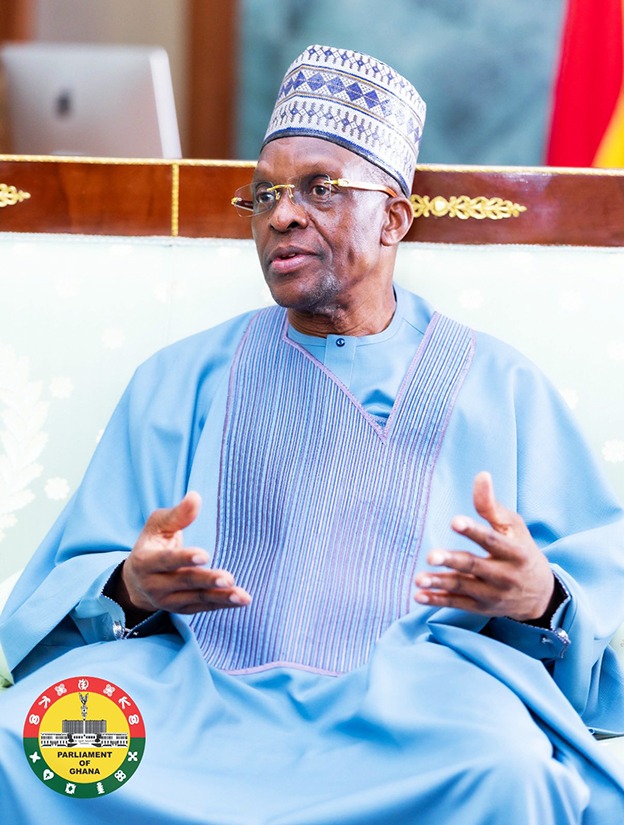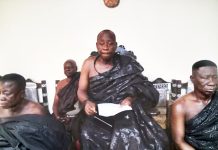The experienced Speaker of Parliament, Alban Sumana Kingsford Bagbin, yesterday truncated the tactful moves by the Minority to frustrate the pre-approval of the nomination of Justice Baffoe-Bonnie as the next Chief Justice.
The minority had already made known they would not support the nomination. However, the majority was not perturbed, due to their large numbers, which met all legal requirements for making decisions in Parliament.
Unyielding, the minority showed signs of its preparedness to activate all the standing orders that could delay and frustrate the majority side in the approval, especially as it was on a day the government wanted to present its budget.
Following the debate on Thursday, November 13, 2025 on the Appointments Committee’s report on the vetting of the CJ nominee, the Speaker put the question for a voice vote, which result the minority challenged.
Under Order 151 (3), the minority first deployed the strategy of calling for a head count, which the Speaker granted, despite objections from the majority.
“At the end of the count, the Ayes [had] 163, the No [had] 69,” Bagbin announced. It would be noted that both side of the political divide were not fully present.
Whereas the ‘super’ majority only marshalled 163, a fall of 26, the ‘mighty’ minority dealt with 69, a deficit of 18.
Leading the plan, the First Deputy Minority Chief Whip, Habib Iddrisu, who had earlier been successful with his call for a head count, now called for a division, arguing that he did not believe in the result.
NOT SUCCESSFUL
At this point, Speaker Bagbin asked for his reason for challenging the result. The member claimed that some ministers who were not MPs were “inside” the chamber during the headcount, which is against the orders.
Speaker Bagbin did not rule out right, but called one of the two ministers to verify or deny the claim, which the Ashanti Regional Minister, Dr Frank Amoakohene, who had attended the proceedings with the Minister for Works and Housing, denied. He told the House that both of them were outside the chamber during the headcount.
Having heard from the minister, Speaker Bagbin ruled by saying, “Honourable Members, it is my view that the division has been unnecessarily claimed.”
The standing orders leave the discretion to the Speaker to determine whether a call for division had been unnecessarily claimed, which discretion the Speaker exercised.
“The motion has accordingly been adopted. This Honourable House has accordingly approved the nomination of Justice Paul Baffoe-Bonnie as Chief Justice of the Republic, in accordance with Article 114, Clause 1 of the 1992 Constitution,” he added.
ARGUMENTS
A cursory observation of the debate and subsequent proceedings on the report of the Appointments Committee on the vetting, last Monday, depicted all sides deploying their arsenals.
Three days after his vetting, the Committee recommended in its report to the House the approval by majority decision. The minority had earlier indicated they would vote en bloc to reject the nomination of the CJ nominee.
The minority wanted the Hansard to capture this record insisting that they were rejecting the nominee based on principle and the fight for judicial independence, but were not permitted, because they kept referring to the legal battles initiated by CJ Torkornoo.
The Speaker told the House that cases filed by CJ Torkornoo were not before the House and urged all debates to be within the report of the appointments committee.
He had cause to direct that debates on the subject he had already ruled on and his ruling not challenged be expunged from the records of Parliament.
The minority, in their debate, referred to the seven separate legal proceedings filed by the embattled former Chief Justice, Gertrude Araba Esaaba Torkornoo, as well as the delay by the Attorney General to file its processes, as it had sought leave of the court for additional time.
The argument of the minority was that it is possible the court may look in the direction of the plaintiff and grant her relief; thus, there is a need to allow all processes to be exhausted before appointing a new CJ.
The minority argued that there was no need “rushing” to appoint a new CJ in the midst of the litigation, as the President had already appointed an acting CJ.
The majority, on the other hand, argued that Parliament could not be estopped from performing its constitutional duty by reason of a proceeding by a different arm of government.
They argued that, should the court rule in favour of the plaintiff, the sitting CJ would have no choice than to obey the decision of the court.
The MP for Effutu, who is the leader, Alexander Afenyo-Markin, the MP for Asante-Akim Central, Kwame Anyimadu-Antwi and the MP for Mampong Akuapem, Samuel Awuku, debated for the minority.
Majority Leader and MP for Bawku Central, Mahama Ayariga; MP for Bolgatanga East and Attorney General Dr Dominic Akurintinga Ayine; the MP for Asawase and Minister for the Interior, Mubarak Mohammed Muntaka also debated for the majority.
For more news, join The Chronicle Newspaper channel on WhatsApp: https://whatsapp.com/channel/0029VbBSs55E50UqNPvSOm2z









